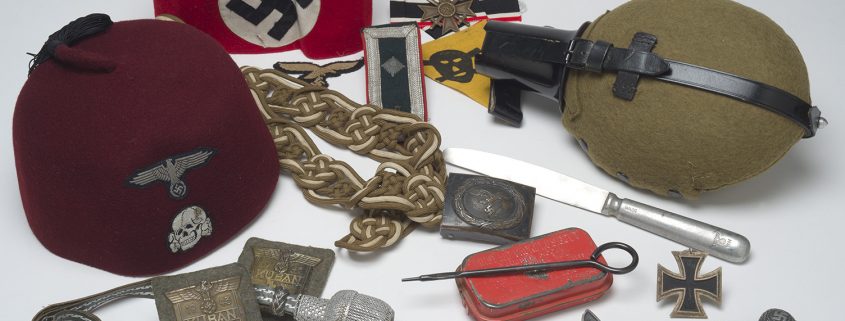USC Shoah Foundation receives World War II artifacts
More than 70 years have passed since the end of World War II, but USC’s expanded collection of wartime artifacts may soon be able to offer new historical insights.
David and Andrea Stanley donated hundreds of items to USC Libraries and the USC Shoah Foundation’s Center for Advanced Genocide Research. The objects came from Andrea Stanley’s father Harry Wolff, Jr., an American Jewish soldier who served in Europe during the war, and includes numerous paper documents that depict Wolff’s wartime experiences.
The documents include around 500 letters exchanged between Wolff and his wife Natalie Rosow. In the letters, Wolff describes his time training as a member of the “C” Gun Battalion in the 3rd Army, as well as his combat experience at Dachau where he guarded German prisoners. These letters also recount his time attending the war crime trials that occurred after the war was over.
The letters are unredacted and the papers go into specific detail about Wolff’s emotional wellbeing during the war. They describe how Wolff strived to preserve his composure even in dangerous situations. He also mentioned his need to stay in control and support others during difficult times.
Wolf Gruner, the founding director of the Center for Advanced Genocide Research and the Shapell-Guerin Chair in Jewish Studies, explained in USC’s Visual History Archive that the collection holds significant historical value because of the firsthand reports that Wolff provided.
“We gladly took this collection because in every letter, Lieutenant Wolff told his new wife, Natalie Rosow, where he got the artifacts from and how he got them and what they mean, which is unusual,” Gruner told USC News.
Gruner said that Wolff’s ability to document his experiences is furthermore remarkable due to the fact that ink was in short supply. His letter-writing activity was also often kept secret. Regardless, Wolff continued to write to his wife almost every single day.
Andrea Stanley said in an interview with USC News, the letters are delicately phrased in order to diminish some of the horrors that took place during the war. Wolff made an effort to protect his wife by including pleasant thoughts. He would describe non-war-related events, such as his efforts to engage in Jewish High Holy Day services.
In addition, the collection contains love notes and letters that Wolff sent home inquiring about his friends’ and family’s wellbeing.
The collection also contains a variety of Nazi artifacts, including flags and medals. Wolff was able to bring back military and civilian newspapers, brochures and photographs.
The collection includes a shard of a swastika that was arranged on top of the Nuremberg Stadium. In 1945, the stadium was famously blown up by U.S. and Russian troops.
Students said that they appreciated the chance to learn about World War II firsthand.
“I am grateful that this collection can expose me to the experiences of a World War II veteran,” said Isabella Dake, a freshman majoring in theatre. “Thanks to the USC Library and Shoah Foundation, I am able to witness history on a tangible level.”
This collection contributes to Gruner’s aim to increase the amount of resources USC has on genocide studies. Since the Center was established in 2014, USC has acquired the original transcript of the Nuremberg trials, along with other diaries, letters and books.
This World War II material is accessible for researchers and students.
“I am impressed by the amount of material USC provides me with in my studies,” said Danielle Hazime, a freshman majoring in human biology and a writer for the Daily Trojan. “Never do I feel like my learning is inhibited by insufficient resources.”

